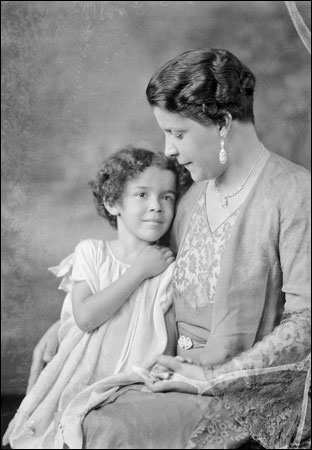The Resurrection Issue
Volume 14:3, Summer 2013
APRIL
April is a wanton
With her cool, slim, searching fingers
And Day, a giddy gossip,
Sitting, waiting on the stair,
Listens to the murmurings
While wayward Romance lingers
To revel in the fragrance
Of her hair!
APRIL PASSED MY WAY
April passed my way, and Romance
Followed after to my door;
Lingered shyly, gently watchful
For my welcome; more and more
In her manner fascinating
As she held my eye
Standing at my doorway, waiting,
Anxious not to pass me by!
Romance came, along with April,
And I let her in;
Shared with her my hearts deep secrets
And, to my chagrin,
Off she slipped and, when she left me,
Stole my treasures all away!
Romance cameand wentwith April!
There is nothing more to say.

Photo by Addison Scurlock, Courtesy of the Smithsonian Institution
REACH DOWN, SWEET GRASS
for H.K.P.
Reach down,
Oh long grass fingers,
Touch her hair
And strokebut softlyher tired eyes!
Make soft
The pillow there
Beneath her weary head,
And maybe, then,
She will not care
That she is dead!
And when
The wild things cry
Their mating songs,
And pregnant Time makes ready to bring forth
Her issue,
Gentle grass
Caress her still,
And loose the earth a bit
So she may hear
The birthing sounds
Of lovely Spring
This year.
Then Beauty
Such as you have never known
Before, dear grass,
Will come to you, I swear,
For being kind to her
Where, quietly,
Alone, yet not alone,
She rests
In silencethere!
Sweet grass
Reach down
And let her know
Whn it is time, this year
That Spring
Is here
Because
She loved it so!
FLAG SALUTE
“I pledge allegiance to the flag”
They dragged him naked
Through the muddy streets,
A feeble-minded black boy!
And the charge? Supposed assault
Upon an aged woman!
“Of the United States of America”
One mile they dragged him
Like a sack of meal,
A rope around his neck,
A bloody ear
Left dangling by the patriotic hand
Of Nordic youth! (A boy of seventeen!)
“And to the Republic for which it stands”
And then they hanged his body to a tree,
Below the window of the county judge
Whose pleadings for that battered human flesh
Were stifled by the brutish, raucous howls
Of men, and boys, and women with their babes,
Brought out to see the bloody spectacle
Of murder in the style of ’33!
“(Three thousand strong, they were!)
“One Nation, Indivisible”
To make the tale complete
They built a fire
What matters that the stuff they burned
Was fleshand boneand hair
And reeking gasoline!
“With Libertyand Justice”
They cut the rope in bits
And passed them out,
For souvenirs, among the men and boys!
The teeth no doubt, on golden chains
Will hang
About the favored necks of sweethearts, wives,
And daughters, mothers, sisters, babies, too!
“For ALL!”
GRANT ME STRENGTH
Give me the strength
Of verdant hills
Washed clean by summer rain;
Of purple hills
At peace when weary Day
Sinks quietly to rest
In Night’s cool arms;
Of rugged, wind-whipped hills
That lift their heads
Above the petty, lowland, valley things,
And shake their shoulders free
Of bonds that hold
Them close to earth;
Of snow-capped hills
Sun-kissed by day, by night
Companioned by the stars;
Of grim volcanoes
Pregnant with the fires
Of molten fury!
Grant me strength,
Great God,
Like that of hills!
Esther Popel Shaw (1896—1958) was born in Harrisburg, PA, and was the first African American woman to graduate from Dickinson College in Carlisle, PA in 1919. After graduation, Popel moved to Baltimore, working for the War Risk Insurance Department and teaching for two years. She then moved to DC. She married William A. Shaw, was widowed in 1946, and raised their daughter, Patricia Shaw Iversen, on her own. Publishing under her maiden name, Popel was the review editor for The Journal of Negro Education, and published poems and essays in Opportunity, Crisis, The Journal of Negro Life, and The Journal of the National Association of College Women. Fluent in four languages (French, Spanish, Latin, and German), Popel taught languages at two DC Public Schools: Shaw Junior High and Francis Junior High. Popel was an active member of the Saturday Nighters, a literary salon in the home of Georgia Douglas Johnson, and a member of the Lincoln Memorial Temple. She wrote six plays for junior high school students, and was a popular public speaker for women's clubs in DC and New York. Her book, A Forest Pool, was privately printed as a "gift edition" in Washington, DC in 1934. In an article, "Personal Adventures in Race Relations," written for public speaking engagements and published in 1946, she wrote: "At a time when all our energies are needed to meet and solve together the crucial problems of the postwar period, we find a large element of the population torn by resentment, suspicion and hatred. The constant and soul-searching humiliation that is the outgrowth of the dangerously reactionary policies of prejudice and biracialism serves to undermine the faith of the Negro, and other minorities, in the very foundation of the democracy they are asked to defend."